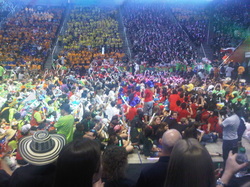
For dyslexic brains, excellent function typically means traits like the ability to see the gist or essence of things or to spot the larger context behind a given situation or idea; multidimensionality of perspective; the ability to see new, unusual, or distant connections; inferential reasoning and ambiguity detection; the ability to recombine things in novel ways and a general inventiveness and intentionality during tasks that others take for granted.
Our school is filled with bright and dedicated students whose brains are wired a bit differently. They work to forge new pathways to learn the basic skills that the school system imprints on the rest of us through more conventional methods. As a "lefty" living in a right-handed world, I have a small window of understanding for the much larger hurdle that they have to overcome. Unfortunately, as schools, families, and even employers we often focus on the "can't" part of the equation as in "they can't learn in the same way as most people" instead of recognizing and celebrating the "can" - "they can see and do things with ease that baffle their more linear peers".
This past week I had the privilege of joining seven of our Grade 5 students, their parents, and coaches to Knoxville, Tennessee for the Global Finals of Destination Imagination. Destination Imagination, the world's largest creative problem-solving programme for elementary and secondary students, is an educational programme in which student teams solve open-ended Challenges and present their solutions at regional, provincial or national tournaments. Teams are tested to think on their feet, work together and devise original solutions that satisfy the requirements of the Challenges. Students gain more than just basic knowledge and skills - they "learn to unleash their imaginations and take unique approaches to problem-solving".
In the lead up to the finals, our students excelled in their regional competition and placed second in British Columbia in their age group and challenge category. This qualified them to head to Knoxville where they joined almost 10,000 students from 12 countries, almost all US states, and six Canadian provinces (BC, Alberta, Manitoba, Ontario, Quebec and Nova Scotia). Now most of our students will never be star athletes or straight "A" students, and they probably won't be the ones whose provincial examination results will be published in the local paper. But many of our students have the potential to be the ones creatively solving the scientific and engineering problems of the future; or the ones designing the most intriguing structures; finding ways out of our environmental quagmire; or creating great works of performance or visual art.
Our students are the outliers who will help society to make remarkably creative leaps into the future. But this will only happen as long as today's teachers and parents help to provide the opportunities for them to flex their creative muscle, to apply their considerable talents and to recognize the fact that being different is not necessarily a bad thing!
So how did our kids do in Knoxville? Well, they didn't win, but they did wonderfully well. As parents and educators we could not have been more proud of their efforts. They were focused and energetic, creative and funny and, (unlike all of us adults), relaxed; as if being in Grade 5, and competing in a world championship, was just another day at the office!
Our students learn differently, and that's what makes them so amazing!


 RSS Feed
RSS Feed
